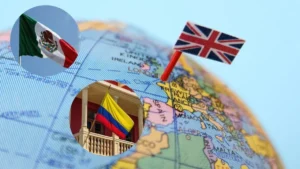TV column “Hard but fair”: “The government can agree on weed, but not on the Growth Opportunities Act”
Tuesday, 08/22/2023, 02:08
“Hard but fair” allows discussion about the weakening German economy and CDU politician Jens Spahn uses every opportunity to lash out at the traffic light coalition.
“For more than ten years, the good economic situation has not been used to improve the framework conditions,” explains Deputy FDP Federal Chairman Johannes Vogel. However, all parameters have been falling for many years – such as the innovative strength of Germany as a business location. The current situation is also the failure of the past. “Angela Merkel didn’t drive on sight, she drove on wear and tear.”
“You mean to say that the traffic light government has nothing to do with it?” asks Jens Spahn, deputy leader of the CDU parliamentary group, shaking his head. “The government can agree on weed, but not on the Growth Opportunities Act.” “You can do it like this,” Johannes Vogel addresses colleague Jens Spahn directly. “But it’s too serious.”
It’s also not about “making cheap points”. However, Johannes Vogel has just as little understanding for the fact that Family Minister Lisa Paus recently blocked the planned tax relief in the billions. “In any case, we need a good economy for all other tasks.”
Evonik board member Kullmann: “It’s like taking on Godzilla with a water pistol”
Evonik CEO Christian Kullmann puts numbers on the table. Although the company recently made a profit of 1.35 billion euros, Kullmann describes a bleak situation. “Before the energy crisis, we paid 700 million euros for the energy, now it’s double that.” The planned relief is around six billion euros. That’s good. But the US government is currently spending 400 billion euros on it. “It’s like taking on Godzilla with a water gun.”
What would embitter many people above all is that Chancellor Olaf Scholz would not keep his promise. During the election campaign, for example, he promised that the industrial electricity price would be four cents per kilowatt hour. “The situation is extremely tense. There is a big question mark over the reliability of this government.” CDU man Spahn adds: “The only things that are growing are unemployment and bankruptcies.”
Green Katharina Dröge wants to subsidize the construction industry
Green parliamentary group leader Katharina Dröge has an idea how her party wants to give the economy a boost. She would like to support the construction industry because there are several opportunities in this area. In this way, energy-efficient building refurbishment improves the climate and social housing helps to create affordable living space. “It has to be credit-financed. This is where we invest in our future. We cannot budget for this magnitude without cutting social spending,” explains Dröge.
Whereby there should be the next gossip in the governing coalition on the issue. The FDP insists on the debt brake. CDU man Spahn also uses this opportunity to step on his feet at the traffic light. “The government is going through with its coalition agreement. But you have to set priorities and use the debt brake properly. ”Because this leaves enough room for priorities. However, economic growth is a prerequisite for leeway.
CDU politician Spahn: “No one knows what applies”
“I don’t need any help from the state,” says Evonik CEO Christian Kullmann. It is wrong to give the impression that the industry is being plastered over with subsidies. After all, the industry would pay many billions in taxpayers’ money. “Whether CDU, FDP, Greens or SPD, everyone says that they want the transformation. But without industry, which is talked about so condescendingly here, nothing would work at all.” No wind turbine would turn, no electric motor would make a difference.
Much of what he hears from politics is political folklore. “These are debates from the day before yesterday. We have to realize that the USA and countries in Asia are doing a lot more.” In Texas, a kilowatt hour would cost two cents, here it is 20 cents. Jens Spahn also goes on a confrontation again. “The dispute in the government means that no one knows what applies.” But economics is always a lot of psychology. The uncertainty is great. “Anyone who can doesn’t invest in Germany. At most if subsidized.”
Bakery owner Künne: “Soon there will only be industrial rolls”
Bakery owner Caterina Künne is responsible for seven branches and 60 employees. She says: “Energy prices have risen significantly, companies that can no longer make it are closing everywhere.” Her company once paid 130,000 euros for electricity, it is currently 260,000 euros. In addition, raw material prices have also risen. “If large bakeries are still being subsidized, we won’t be able to keep up.” Because if it were up to the Greens, the electricity price brake would only apply to companies that, among other things, are in international competition. Künne’s business is not included. “The big ones are helped. Why not everyone?” asks the bakery owner.
“If Habeck continues like this, there will soon only be industrial rolls.” Kühne does not understand why a green party, which actually wants to promote regionality, does not support the baker around the corner. “Why do so many go to Lidl and Aldi? Because they can no longer afford it. Everything has its consequences. After all, we are a World Heritage Site.”
Source: https://www.focus.de/community/kolumnen/focus-fernsehclub/tv-kolumne-hart-aber-fair-auf-kiffen-kann-sich-die-regierung-einigen-aber-nicht-auf-das-wachstumschancengesetz_id_202475865.html


